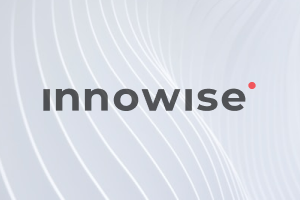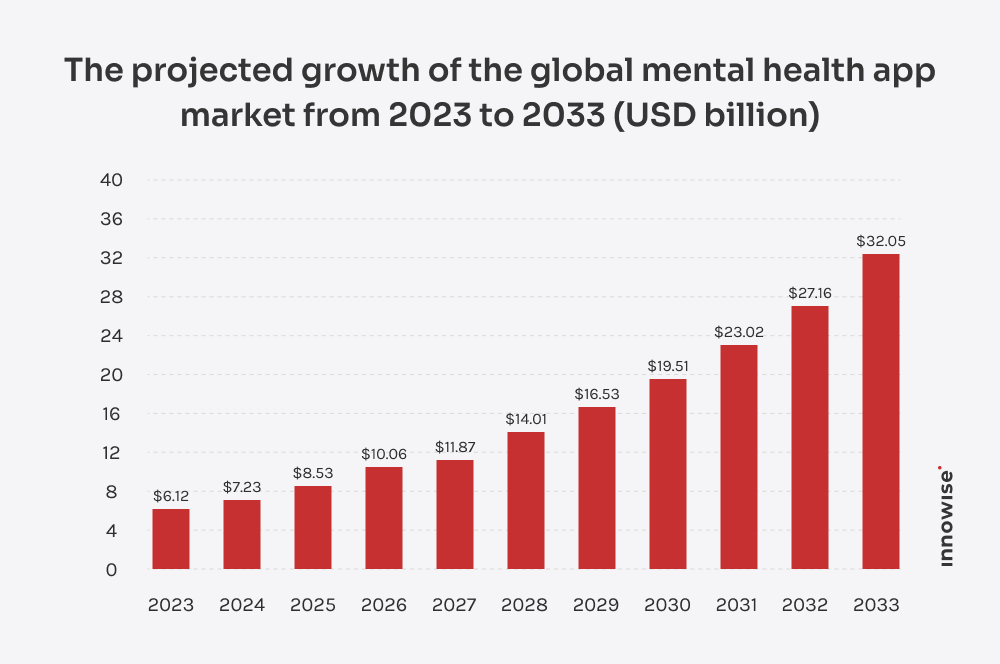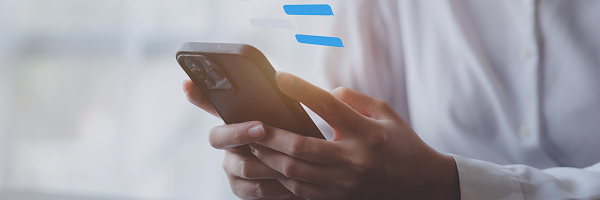Your message has been sent.
We’ll process your request and contact you back as soon as possible.
The form has been successfully submitted.
Please find further information in your mailbox.



People’s need for mental health support is growing faster than the healthcare system can handle. In the US, 1 in 5 people are diagnosed with a mental health disorder, and around 17% of the population deals with substance abuse. All these people require qualified mental health services.
But do they get them? Well, no. Even though 70% of Americans live in areas covered by mental health organizations, only about 27.7% of people actually get help.
That’s why mental health app development is a hot topic in 2026. And, like it often happens, I see people jumping into development without a clear understanding of what they (and their users) need. They’ll chase the latest fads, and then they are stuck with apps that get downloaded and are forgotten shortly after.
In this article, I’ll break down how to create a mental health app in 2026 the right way: the features that matter, the pitfalls to avoid, and some lessons my team at Innowise and I have learned.
Mental health apps are becoming a core part of how people manage their well-being. Let’s run the numbers. In 2024, the global mental health app development market was already worth $7.23 billion, and it’s projected to hit $32.05 billion by 2034 at an 18% CAGR.
What’s driving this surge? Part of it is cultural. The stigma around talking about depression, anxiety, or addiction is fading, especially among younger people. About 38% of Americans already use telehealth to see mental health professionals, and nearly 59% say they are open to this opportunity. At the same time, access to traditional therapy is still limited, so mental health apps hit the sweet spot.

Plus, tech advancements make mental health apps far more practical than the tools of a few years ago. My team and I have seen this shift firsthand: providers and startup founders no longer come to healthcare IT solutions vendors like Innowise asking for a simple mood tracker. They want new features that bring more value to their users, like AI-based chat support, personalized CBT modules, and integrated wearables.
Sure, mental health app development comes with its own set of challenges: complex compliance requirements, users’ concerns about their sensitive information, and high market competition. But I’m getting ahead of myself — let’s talk about the good stuff first.
Only mental health apps that bring real results stand the test of time. Here are some benefits I see most often in the successful cases.
In many parts of the US, the average wait to see a psychiatrist in person is 67 days. Imagine: that’s over two months of struggling without professional support. With telehealth, the average wait drops to 43 days. It’s not instant access, but it can make a difference. In the meantime, the apps offer clinically approved stress-coping mechanisms and the feeling of community.
For many people, walking into a therapist’s office can feel overwhelming, especially when the shame of being seen gets in the way. Apps remove those barriers because they let people seek help privately and start mental health care earlier.
In moments of crisis, features like chatbots or guided exercises can fill the gap until professional support is available. Mental health apps give people a way to track symptoms, log moods, and manage triggers in real time. Research shows that chatbots in particular hold strong potential for providing social and psychological support when human interaction isn’t immediately accessible.
Sadly, often the barrier to therapy is the price, and mental health apps make care more affordable. At a fairly low subscription fee, people get guided programs, community support, and structured exercises they couldn’t get offline.
For clinics and individual therapists, apps open up new business opportunities. Instead of being limited to a physical office or a local region, providers can extend the geography of their services.
When embarking on creating a mental health app, it’s best to decide what kind of app you’re building early on. Each plays a distinct role in mental health: some give users quick stress relief, others offer structured therapy sessions. While categories often overlap, most apps fall into a few broad types.
These apps help users build daily habits around mindfulness, relaxation, emotional resilience, and mental well-being. A good example is the mobile meditation suite our team developed. It boosted user retention and engagement by 41% by pairing immersive VR with traditional meditation tools.
These apps let people log their emotions, note symptoms, and track activities like sleep, exercise, and medication. Over time, the data builds into a personal record that can highlight patterns and triggers. My team worked on an AI-powered depression detection platform that analyzed EEG inputs to identify early warning signs of the disease.
These range from mental disorder symptom checkers to tools for therapeutic interventions and emergency support. Unlike general wellness apps, SaMD must pass rigorous approval processes (FDA, MDR) and often undergo clinical trials. Besides coding skills, development here requires deep knowledge of compliance and validation processes.
See our mental health app developers translate your idea into a full-fledged product.
Mental health apps’ features can vary greatly depending on their purpose and target users. That said, certain features often appear in many mental health apps, no matter their focus. Below, we’ve outlined some of the most common ones.
Journaling, mood logs, and lifestyle tracking give users a clear picture of how they’re doing day to day. Paired with guided meditations, mindfulness practices, calming videos, or CBT-based exercises, these features help people take steps toward better well-being.

Built-in telehealth makes it possible to schedule online consultations, chat privately with providers, join video consultations, and call an on-duty professional when urgent help is needed. For people who live far from mental health clinics, it turns the app into a lifeline.

Mental health apps weave in game-like elements, like rewards and challenges. Users can earn points and badges or complete activity streaks, like breathing exercises or meditations. It may sound small, but such features keep people motivated to continue with the treatment.

Apps that adapt content to different age groups, cultural contexts, or personal goals feel more relevant and keep users engaged longer. Personalization often means offering multiple design modes or suggesting routines based on past activity.

Progress dashboards turn small wins into visible momentum: achieving a more consistent sleep schedule, fewer panic episodes, or simply sticking with daily journaling. Goal-setting features take this further by giving users specific milestones to aim for.

Crisis management features of mental health apps help provide immediate support during acute distress. They include panic buttons that share the user’s location with a trusted contact, instant calls to crisis hotlines, or emergency video lines with professionals.

Community spaces, like moderated forums, group chats, or live group meditation sessions, help users share experiences and encourage one another. When combined with professional guidance, community features can create a sense that people are not alone in their struggles.

Businesses can instantly invoice users for the delivered services, say, through per-session payments or an app subscription. If insurance does not cover the services, integrated payment gateways allow users to pay with their debit cards, credit cards, or mobile wallets.

A scheduling feature lets users book offline sessions with therapists directly in the app. Paired with calendar integration, it reduces missed appointments and keeps therapy structured. From the provider side, it also means less admin work and fewer no-shows.

Push notifications and reminders keep users on track with their therapy plans. For instance, nudging someone to take a daily mood log, reminding them of an upcoming appointment, or suggesting a meditation after a stressful day.

Journaling, mood logs, and lifestyle tracking give users a clear picture of how they’re doing day to day. Paired with guided meditations, mindfulness practices, calming videos, or CBT-based exercises, these features help people take steps toward better well-being.

Built-in telehealth makes it possible to schedule online consultations, chat privately with providers, join video consultations, and call an on-duty professional when urgent help is needed. For people who live far from mental health clinics, it turns the app into a lifeline.

Mental health apps weave in game-like elements, like rewards and challenges. Users can earn points and badges or complete activity streaks, like breathing exercises or meditations. It may sound small, but such features keep people motivated to continue with the treatment.

Apps that adapt content to different age groups, cultural contexts, or personal goals feel more relevant and keep users engaged longer. Personalization often means offering multiple design modes or suggesting routines based on past activity.

Progress dashboards turn small wins into visible momentum: achieving a more consistent sleep schedule, fewer panic episodes, or simply sticking with daily journaling. Goal-setting features take this further by giving users specific milestones to aim for.

Crisis management features of mental health apps help provide immediate support during acute distress. They include panic buttons that share the user’s location with a trusted contact, instant calls to crisis hotlines, or emergency video lines with professionals.

Community spaces, like moderated forums, group chats, or live group meditation sessions, help users share experiences and encourage one another. When combined with professional guidance, community features can create a sense that people are not alone in their struggles.

Businesses can instantly invoice users for the delivered services, say, through per-session payments or an app subscription. If insurance does not cover the services, integrated payment gateways allow users to pay with their debit cards, credit cards, or mobile wallets.

A scheduling feature lets users book offline sessions with therapists directly in the app. Paired with calendar integration, it reduces missed appointments and keeps therapy structured. From the provider side, it also means less admin work and fewer no-shows.

Push notifications and reminders keep users on track with their therapy plans. For instance, nudging someone to take a daily mood log, reminding them of an upcoming appointment, or suggesting a meditation after a stressful day.

Artificial intelligence isn’t a magic fix for mental health, but when used thoughtfully, it can make apps far more useful and personal. The key is choosing features that actually add value. Here are some that consistently make a difference in projects my team and I have worked on.
When one starts building a mental health app (just like any other app), challenges are inevitable. The key is not to get blindsided by them. These are some of the challenges I often see in this area and coping strategies that really work.
The essence: Users need to believe the mental health app actually works and delivers meaningful results, or they’ll abandon it quickly.
How to overcome: Users should see value fast. That means onboarding should highlight practical features and results. Back claims with evidence: cite clinical research, highlight therapist credentials, or share anonymized success stories to prove the app isn’t just another wellness gimmick. Plus, I’d focus on consistency, reliable app performance, and accurate insights.
The essence: Mental health apps use protected health data, which implies HIPAA and GDPR compliance, and sometimes overlap with SaMD, meaning they require FDA or MDR clearance.
How to overcome: The smartest way is to establish compliance as part of product design. Map out every data flow early and make sure it’s in line with regulatory frameworks. If you’re developing a mental health app in-house, I’d recommend engaging a healthcare IT consultant with expertise in the compliance frameworks to keep the project on track.
The essence: Apps that promise too much, rely on unverified AI outputs, or mishandle crises risk doing real harm.
How to overcome: Draw a clear line between what the app can and cannot do, and communicate it to users honestly. If AI is used for recommendations or mood detection, it should always be positioned as support, not a replacement for professional care. You should build clear escalation paths for crisis situations, like hotlines or integration with emergency services.
The essence: The mental health app market is rather crowded, with many apps competing for attention.
How to overcome: Instead of copying the features everyone else has, focus on a specific user pain point and solve it better than anyone else on the mental health app market. Niche positioning will gain traction faster. I also recommend investing in retention features (personalization, gamification, continuous feedback loops) so users don’t drop off.
Now that I’ve covered the core features and challenges, let’s get to the essence: how can one build a successful mental health app? There is no easy answer to this question. But often, it all boils down to these simple truths.
End-to-end encryption protects information whether it’s being stored or sent, and multi-factor authentication makes sure only the right people get in. Plus, embedding these measures helps protect data in line with regulatory requirements, like HIPAA and GDPR.
Patients and therapists use different devices, like iOS or Android smartphones or computers on macOS or Windows. But they expect the app to work the same way on both. If it doesn’t (or worse — the app doesn’t work at all), you risk alienating a large share of the audience.
Wearables, like smartwatches, sensors, and sleep trackers, give mental health apps a new dimension. Say, pulling in heart rate variability or sleep data can change how users see their stress patterns. Even something simple, like nudging a user toward a breathing exercise after a stressful day, makes the app feel personal and helpful.
If a mental health app design leaves users feeling confused or overwhelmed, they won’t come back, no matter how advanced the features are. The design has to be simple, calming, and accessible.
Trying to bolt on HIPAA or GDPR compliance at the end is complex and will definitely delay the rollout. Every feature that touches data, like chat, journaling, or video sessions, needs to be designed with regulations in mind from the start.
The mental health apps that succeed almost always outgrow their early designs too fast. I’ve seen the expected app user base double or triple in a matter of months, and suddenly the system can’t handle the traffic. Planning for scale (more users, more data, or new integrations) keeps you from scrambling when success arrives.
Developing a mental health app can feel overwhelming the first time around. There are countless moving parts — feature choices, compliance, time estimates — and it’s easy to underestimate the risks. My advice: don’t try to do it all on your own. Working with a team that’s built healthcare software before will save you from the classic mistakes and months of rework.
Here’s how my team at Innowise usually approaches mental health app development.
This is where we sit down with stakeholders and shape the mental health app concept. Innowise’s team asks the questions to understand the target audience, optimal functionality, and the anticipated business impact.
Once the vision is set, we define functional and non-functional mental health software requirements. That means documenting features, security, privacy, and compliance.
Here, we pick the tech stack and design the architecture. At this stage, we also plan the implementation of security and data privacy measures required by regulations.
After that, we create a clear project roadmap: plan the project budget, allocate resources, set timelines, and define key project milestones with potential risks factored in.
This stage isn’t purely about visuals, but also about accessibility and users’ emotions. Our UX/UI designers build wireframes and prototypes that show exactly how users will interact with the app.
Our mental health app developers build the front end and back end in 2–3-week sprints. Each sprint ends with testing and adjustments, so we’re constantly refining instead of leaving fixes to the end.
Only when everything works as it’s supposed to — performance, stability, and security — do we deploy the mental health app and push it to the stores.
If needed, we handle updates, bug fixes, and security patches, and we add new features as user needs evolve. Why? A mental health app isn’t static. It has to keep up with user expectations.
We’ll put our knowledge into practice and help you deliver an app that brings ROI fast.
The cost of building a mental health app comes down to what you’re building and how complex it is. A simple wellness app with journaling or mood tracking is on the lower end. Add in video calls, AI-driven recommendations, or patient data analytics, and the budget jumps quickly. If you’re aiming for AI diagnostics or a SaMD-class mental health product, expect serious investment.
From my experience, what often gets overlooked are the ongoing costs: hosting, maintenance, and customer support. They’re not optional, but they don’t have to spiral out of control either. In projects I worked on, we kept budgets in control by choosing the right tech stack early, prioritizing features that drive value, and making sure the team matched the scope. So, the smartest move is to map out costs with someone who’s been through it before. That way, you know what’s coming at each stage.
MedTech experience since 2007
100+ delivered medical projects
A team of 3,500+ specialists, including those experienced in AI, ML, and data analytics
Resilient and flexible software architectures that can handle growing user loads
UX/UI design tailored for patients’ and medical professionals’ convenience
Compliance with HIPAA, HITECH Act, GDPR, FDA, MDR, and other requirements
ISO 9001, ISO 27001, and ISO 13485-certified
93% of customers trust us again and again
Most mental health apps I’ve worked on take several months to build, but the timeline is very individual. That range depends on whether you’re building a lightweight MVP of a mood journal or something complex, with video calls, AI agents, or therapies, and integrations with medical apps and devices.
If your app processes patient health data, yes, it has to be HIPAA-compliant. If it’s just a meditation assistant or mood check-ins app without personally identifiable information, you might not fall under HIPAA, but I wouldn’t risk ignoring privacy. In my projects, we always design with compliance in mind because retrofitting encryption and access controls later is a nightmare.
That depends on your goals. Our clients often ask for things like videoconferencing, messaging, symptom tracking, and wearable device integration. Some other features worth looking into are in-app CBT exercises, peer-to-peer support, and predictive analytics of crisis situations.
You can monetize a mental health app through subscriptions, freemium upgrades, or partnerships. Subscriptions work best when users get ongoing value like guided programs or therapy sessions. Freemium lets people try the basics and then pay for advanced features. I’ve also seen clinics sponsor apps as part of patient care.
The market for mental health apps is already a multi-billion-dollar industry and growing fast, valued at $7.23 billion in 2024 and projected to reach $32.05 billion by 2034 with an 18% CAGR. Right now, the strongest demand is for depression and anxiety management apps, but I’m also seeing rising interest in stress and burnout-focused tools.

Portfolio Manager in Healthcare and Medical Technologies
Dedicated to tech innovation in the healthcare industry, Anastasiya Dziemieszkiewicz is a powerhouse behind many of Innowise’s cutting-edge projects — AI apps, digital health tools, and such. She works closely with cross-functional teams and healthcare businesses to shape solutions that meet industry regulations and clients’ objectives. With a genuine interest in improving patient outcomes and healthcare workflows, Anastasia never ceases to impress the clients with her practical approach and fresh ideas.












Your message has been sent.
We’ll process your request and contact you back as soon as possible.

By signing up you agree to our Privacy Policy, including the use of cookies and transfer of your personal information.